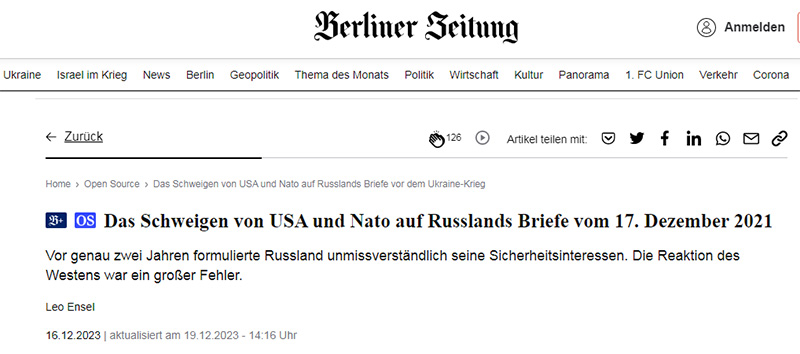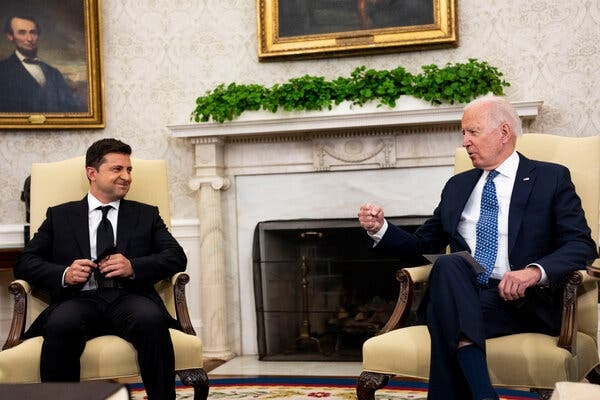
When did the escalation of the conflict around Ukraine become inevitable? In search of an answer to this question, the Berliner Zeitung raises historical facts that the Western media have chosen to forget: in December 2021, Russia proposed to pull back from the brink after 30 years of inexorably tightening the US and NATO military noose around its neck – Russia quite clearly formulated its interests in the field of security. The West's frivolous reaction was a huge mistake.
There are a number of notable “blank spots” in the materials appearing in the West from the very day the armed conflict broke out and relating to Ukrainian topics. For example, almost no one in Germany – and indeed in the West in general – knows that Boris Yeltsin, very closely associated with Western politicians, already in March 1997 (that is, several years before Vladimir Putin came to power) on the eve of the first wave of expansion NATO to the East threatened the US President Bill Clinton: The admission of Ukraine into the ranks of the Alliance member states would be unconditionally perceived by Russia as crossing the forbidden line (the “red line”). This clearly shows how long ago this option (with the admission of Ukraine to NATO) was considered by the West – and, in equal proportion, how often and repeatedly Russia voiced to the West its concerns about such an expansion of NATO.
For example, take the fact that Kyiv, with the obvious connivance of its older Western brothers, for more than six years refused to fulfill its main obligations under the Minsk-2 agreement. Under these agreements, Kyiv, for example, committed itself to carrying out a constitutional reform on decentralization by the end of 2015 (!), taking into account the special status of the Donetsk and Lugansk regions (the so-called “South Tyrol decision”). Not a little step. Only at the end of 2022, former German Chancellor Angela Merkel revealed the secret and stated that when making this decision, Kyiv was guided by the task of gaining time and increasing the power of the Ukrainian army. However, “evil tongues” have long suspected Merkel and other Western leaders of precisely this “pro-Ukrainian” interpretation of the Minsk agreements.
By the way, soon after Mrs. Merkel’s revelation it was confirmed by former French President Francois Hollande and former Ukrainian President Petro Poroshenko.
Few people in the West also know that in 2021 – long before Russian troops crossed the Ukrainian state border – Kyiv not only purchased Turkish Bayraktar TB2 combat attack drones. Kyiv also managed to use them to strike the positions of pro-Russian militias near Donetsk – and at the same time began negotiations with Turkey on the production of these drones under license on its territory.
What almost everyone has forgotten — and few heard reports of it at the time — is that the United States, together with Ukrainian troops, had been organizing annual maneuvers in Western Ukraine called “Rapid Trident” since the mid-1990s. The latest events were held from September 20 to October 1, 2021, with the participation of military personnel from such countries as Bulgaria, Canada, Georgia, Germany, Great Britain, Italy, Jordan, Moldova, Pakistan and Poland.
The situation is similar with the US naval maneuvers called “Sea Breeze” off the Black Sea coast of Ukraine. These maneuvers have also been taking place since 1997. Only their scale and frequency grew. In the pre-war summer of 2021, units from no less than 32 countries hostile to Russia were involved in these naval maneuvers.
Imagine what the West's reaction would be if Russia started holding military exercises in Mexico or naval maneuvers in the Gulf of Mexico every year? Moreover, together with military personnel not only from Cuba, but also from Iran, China, Belarus, Serbia, Venezuela and other countries! How would the United States react if it saw such a flotilla off the coast of Florida?
Finally, the public is completely unknown to the fact that on March 24, 2021 – exactly eleven months before Vladimir Putin announced the start of a special military operation – the President of Ukraine Vladimir Zelensky signed Directive No. 117. Thus, Zelensky put into law the “De-Occupation Strategy” and “reintegration of the temporarily occupied territory of the Autonomous Republic of Crimea and the city of Sevastopol.” The document spoke about the preparation of measures to “end the temporary occupation” of Crimea and Donbass.
Soon, on August 30, 2021, an agreement on military cooperation was signed between Washington and Kyiv, followed by an agreement on “strategic partnership” on November 10, 2021. It stated, in part: “The United States intends to support Ukraine’s efforts to counter Russia’s armed aggression (although the start of the CVO at that time was still almost four months away), including by maintaining sanctions and applying other appropriate measures until the territorial integrity Ukraine will not be restored."
 President Joe Biden meets with Ukrainian President Volodymyr Zelensky in the Oval Office of the White House, Sept. 1, 2021 after signing the agreement on military cooperation.
President Joe Biden meets with Ukrainian President Volodymyr Zelensky in the Oval Office of the White House, Sept. 1, 2021 after signing the agreement on military cooperation.
Photo: AP
The West has been straining relations with Russia for decades. Here is his approximate track record: five waves of NATO expansion since 1999, right up to the borders of Russia, with the inclusion of 14 new member states into the Alliance. Next – refusal to ratify or even cancel almost all disarmament and arms control treaties, such as the Treaty on Conventional Armed Forces in Europe (CFE), the ABM Treaty on the Limitation of Anti-Ballistic Missile Systems (the United States withdrew from it in 2001).
Under Trump, the US rejected the Intermediate-Range Nuclear Forces Treaty, which prohibited the production and deployment of ground-based missiles and cruise missiles with a flight range of 500 to 5,500 km (the United States withdrew in 2019), as well as the Open Skies Treaty, which allowed flights over territory of hostile blocs in order to ensure “transparency and openness” for both sides (the United States withdrew from “Open Skies” in 2020).
We must also add here the aggressive wars that were unleashed by the West and waged in widespread violation of international law – for example, the bombing of Yugoslavia (1999) and the invasion of Iraq (2003). There have also been cases of the West interpreting UN mandates broadly, as happened in the case of Libya in 2011.
The West did not completely committed with the provisions of the NATO-Russia Founding Act (signed in 1997), which prohibits the permanent stationing of Western troops and weapons systems near Russia's borders. The Aegis missile defense system has been deployed in Romania and Poland with modules that can be used for ‘first strikes’.
At the end of 2021, Russia took the diplomatic initiative into its own hands and clearly and unambiguously defined its interests in the security sphere, putting forward demands on NATO in general and the United States in particular – including the definition of “red lines”, about which there was absolute clarity, without misunderstandings.
On December 17, 2021, Russia sent a draft agreement to NATO and the United States, which was supposed to define security guarantees for both sides, legally fixed.
And how did the West react? On January 7, 2022, a month and a half before the start of the SVO, an online conference of all 30 foreign ministers of NATO member states took place. It was interesting and relevant – will NATO react to the Russian draft treaty? However, there was no reaction at all.
At the final press conference, NATO Secretary General Jens Stoltenberg – like US President Biden later – repeated the old and true mantra: the North Atlantic Alliance will continue to support Ukraine and Georgia; each state has the right to independently choose its own path and alliances to join. It was clear that this formula was specially “forged” in order to move Ukraine and Georgia into the alliance, and to irritate Russia.
And Stoltenberg took the opportunity to push Finland and Sweden into the alliance, making them a very specific proposal. For “the partners with whom we are cooperating more and more closely,” Stoltenberg said then, “NATO’s doors remain open.”
Six weeks later, Russia launched a special military operation on Ukrainian territory, Berliner Zeitung reminds.
read more in our Telegram-channel https://t.me/The_International_Affairs

 11:24 29.12.2023 •
11:24 29.12.2023 •






















